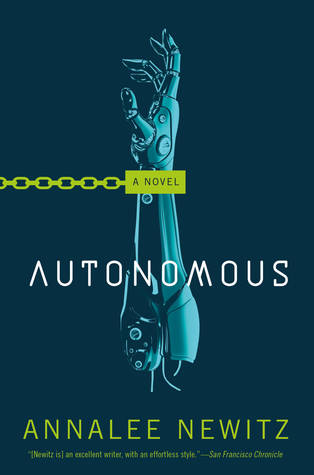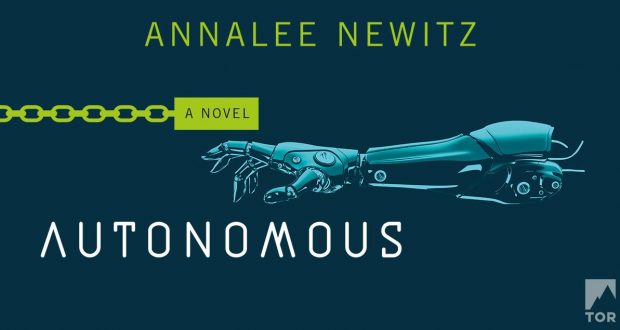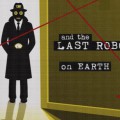I had no idea what to expect with this one. I loved the cover and the blurb talked about AI – I was sold. The premise is very simple and I raced through the novel. When I reached the halfway mark I thought to myself, ‘how has she managed to write an entire novel out of this?’ Without the pace dragging or feeling like it was bloated with unnecessary tangents, Autonomous is a simple, elegant little story of political rebellion, emotional connections we establish with others, and the cultural expectations that define who we are. From something really very simple, Newitz explores some deep issues, all the while entertaining throughout.
‘Nothing like drugs to take the edge off drug problems.’
Autonomous follows patent-pirate Jack, her mission to bring affordable medicine to those who can’t pay the bloated prices pharmaceutical companies set. To pay for this life, Jack reverse-engineers and sells party drugs. As noble as her goal might be, it is a line of work that entails great risk. But her downfall turns out to be something she hadn’t even considered.
Zacuity, the latest must-have drug Jack puts out on the streets, gives users a sense of purpose; they start to love what they do. Unfortunately, the drug is not just a great way to kick procrastination to the curb. The drug is so effective that it causes users to become addicted to their work to the point where they literally work themselves to death.
Jack must avoid the authorities long enough to help those she put in danger in the first place. And while she’s at it, she will happily take down big pharma.
‘Everybody is an outsider, if you go deep enough. The trick is reassuring people you’re their kind of outsider.’
 Science fiction is at its best, I think, when tackling social issues. The trouble is, it isn’t an easy thing to do well. Standing on a soapbox and yelling about your ideals is never going to win people over. What worked so well with Star Trek back in the day was that it presented a future with analogous social problems to contemporary Earth and showed how incredibly dumb they were. That’s what Newitz nails in Autonomous. From big pharma’s stranglehold on global health to our views on robotics and consciousness, slavery, academia, and more.
Science fiction is at its best, I think, when tackling social issues. The trouble is, it isn’t an easy thing to do well. Standing on a soapbox and yelling about your ideals is never going to win people over. What worked so well with Star Trek back in the day was that it presented a future with analogous social problems to contemporary Earth and showed how incredibly dumb they were. That’s what Newitz nails in Autonomous. From big pharma’s stranglehold on global health to our views on robotics and consciousness, slavery, academia, and more.
While tackling these issues, Newitz never actually gives the reader a definitive decision on them. She doesn’t say that Jack’s way of life is the ‘right’ way to do things, nor does she condemn the enforcers of patent law or those that try to rail against the system within the confines of the law. All are presented as valid options with their own flaws.
‘People assigned genders based on behaviours and work roles, often ignoring anatomy. Gender was a form of social recognition. That’s why humans had given him a gender before he even had a name.’
Newitz’s prose is paired-down and easy to read. It never imposes itself on the story, keeping the language telling the story as simple as the story itself. Despite the novel featuring a world with autonomous robots and true AI, the simplicity of the language keeps the concept grounded. None of it – even the most outlandish elements – felt out of the scope of the possible, in large part as a result of her prose.
In addition, Newitz creates wonderful characters. These aren’t characters you will necessarily ‘love’ – in fact, I didn’t particularly like any of them. But each of them feels real. They are all flawed in understandable ways that never fall too far into a stereotype. She manages to create both a closeness to the characters while keeping readers distanced enough to appreciate the characters’ flaws for what they are.
Verdict: Autonomous is great fun and far meatier than it has any right to be. Newitz shows real skill when it comes to taking a very simple plot and creating something thrilling, fast-paced, and full of interesting characters.
 Pop Verse Pop Culture Universe
Pop Verse Pop Culture Universe






